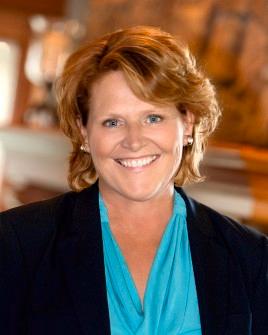
The toughest question U.S. Sen. Heidi Heitkamp would have to answer if she decides to run for governor in North Dakota in 2016 is this: Why do you want to quit a job state citizens elected you to do, especially when you haven't even completed your first term?
That is essentially what Heitkamp would have to do if she wanted to run for governor in 2016. She'd be four years into her six-year Senate term and she'd have to have a darn good reason why she'd be willing to quit that job if she was fortunate enough to win the election for governor.
This is a topic only because Minot Rep. Roscoe Streyle, a Republican, has proposed changing the way North Dakota replaces a congressional vacancy. The proposal would require a special election to fill a vacant seat, instead of the current method of appointment by the governor.
Streyle admits he had Heitkamp on the brain when he made the proposal. If it becomes law, it would be a disincentive for Heitkamp to run because she couldn't appoint a Democrat to fulfill her Senate term. (Which might be the second-toughest question she'd have to answer during a gubernatorial run: Who will you appoint to replace you, should you win?)
Of course, there is a fairly obvious answer to the question Heitkamp would face. She could face the citizens and say, " Washington D.C. is a gridlocked mess. I am frustrated by it. I believe I can better serve the great state of North Dakota by being governor."
It would be an honest answer, but would the voters of North Dakota be comfortable with it? That's the unanswerable question, if Heitkamp decides to pursue the governor's job.
It's still a very big "if," although it's also true Heitkamp has not ruled it out. Given ample opportunity in the state's media to say no, she hasn't. Instead, she's referred to her previously open desire to be governor. She ran against John Hoeven in 2000 and lost.
Oh, the intrigue. My guess is that Heitkamp will not give a definitive answer for a long, long time -- all the better to make Republicans sweat (particularly Lt. Gov. Drew Wrigley, who appears to be the Republican heir apparent should Gov. Jack Dalrymple decide to not run for another term.) My guess is also that there will be polling done, if it's not already underway.
It will be a monumental decision by Heitkamp, both personally and in regards to the future ofNorth Dakota politics.
If she runs for governor and wins, she'll be fulfilling a lifelong dream and will have the power to direct state policy in the manner she sees fit (working, of course, with a Republican-controlled Legislature). That means focusing not on kissing the boots of the oil industry, as Dalrymple and his state government have done, but putting energy and resources toward the underserved in North Dakota -- children, Native Americans, the poor, abused women, etc. Those are the things she's focused on while in D.C.
If she runs for governor and loses, Heitkamp's political career will be finished once her Senate term is up. How could she run for a job a second time when she wanted to abandon it for something else a couple of years prior?
From a state perspective, a Heitkamp victory would change the landscape from the moment she was inaugurated. The Democratic-NPL Party has been on life support for years. "Gov. Heitkamp" would resuscitate the party in a way that otherwise may take decades. A Democrat would have the bully pulpit and could control the statewide political conversation. Republicans, a supermajority in the legislature now and for the foreseeable future, would need to worry about Heitkamp's veto power (although they could override vetoes). There would actually be checking and balancing.
And there is this: A Democratic governor has the power of appointments and would appoint mostly Democrats to lead state agencies, task forces, boards, commissions, committees and councils. There are somewhere in the neighborhood of 400 appointments made by the governor. That volume of Democrats suddenly infused into state government immediately revives a party that currently is left to celebrate winning a legislative seat here and there.
Whether or not Heitkamp runs may also depend on what Dalrymple decides. Will he ride off into the sunset? Or will he decide to run for another term? Dalrymple would be 68 years old on Election Day 2016, and 72 at the completion of the term (should he be re-elected). Democrats, even one as popular as Heitkamp, have a tough time in statewide races in deeply red North Dakota. It would be even tougher, perhaps unwinnable, against an uber-popular governor like Dalrymple. Heitkamp would much prefer to run against Wrigley.
An interesting side note: One of Heitkamp's closest friends in the Senate, Claire McCaskill ofMissouri, recently said she would not run for governor in her home state. She contemplated returning home to have a greater impact on Missouri, but decided over the holidays to instead run for re-election in the Senate.
Will McCaskill's decision affect Heitkamp's? Like every other aspect of this story, we'll have to wait and see.
(Mike McFeely is a talk-show host on 790 KFGO in Fargo-Moorhead. He can be heard 2-5 p.m. weekdays. Follow him on Twitter @MikeMcFeelyKFGO.)